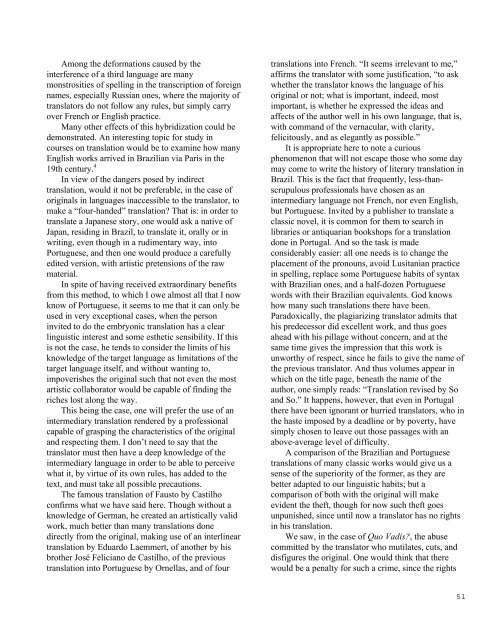their - The University of Texas at Dallas
their - The University of Texas at Dallas
their - The University of Texas at Dallas
You also want an ePaper? Increase the reach of your titles
YUMPU automatically turns print PDFs into web optimized ePapers that Google loves.
Among the deform<strong>at</strong>ions caused by the<br />
interference <strong>of</strong> a third language are many<br />
monstrosities <strong>of</strong> spelling in the transcription <strong>of</strong> foreign<br />
names, especially Russian ones, where the majority <strong>of</strong><br />
transl<strong>at</strong>ors do not follow any rules, but simply carry<br />
over French or English practice.<br />
Many other effects <strong>of</strong> this hybridiz<strong>at</strong>ion could be<br />
demonstr<strong>at</strong>ed. An interesting topic for study in<br />
courses on transl<strong>at</strong>ion would be to examine how many<br />
English works arrived in Brazilian via Paris in the<br />
19th century. 4<br />
In view <strong>of</strong> the dangers posed by indirect<br />
transl<strong>at</strong>ion, would it not be preferable, in the case <strong>of</strong><br />
originals in languages inaccessible to the transl<strong>at</strong>or, to<br />
make a “four-handed” transl<strong>at</strong>ion Th<strong>at</strong> is: in order to<br />
transl<strong>at</strong>e a Japanese story, one would ask a n<strong>at</strong>ive <strong>of</strong><br />
Japan, residing in Brazil, to transl<strong>at</strong>e it, orally or in<br />
writing, even though in a rudimentary way, into<br />
Portuguese, and then one would produce a carefully<br />
edited version, with artistic pretensions <strong>of</strong> the raw<br />
m<strong>at</strong>erial.<br />
In spite <strong>of</strong> having received extraordinary benefits<br />
from this method, to which I owe almost all th<strong>at</strong> I now<br />
know <strong>of</strong> Portuguese, it seems to me th<strong>at</strong> it can only be<br />
used in very exceptional cases, when the person<br />
invited to do the embryonic transl<strong>at</strong>ion has a clear<br />
linguistic interest and some esthetic sensibility. If this<br />
is not the case, he tends to consider the limits <strong>of</strong> his<br />
knowledge <strong>of</strong> the target language as limit<strong>at</strong>ions <strong>of</strong> the<br />
target language itself, and without wanting to,<br />
impoverishes the original such th<strong>at</strong> not even the most<br />
artistic collabor<strong>at</strong>or would be capable <strong>of</strong> finding the<br />
riches lost along the way.<br />
This being the case, one will prefer the use <strong>of</strong> an<br />
intermediary transl<strong>at</strong>ion rendered by a pr<strong>of</strong>essional<br />
capable <strong>of</strong> grasping the characteristics <strong>of</strong> the original<br />
and respecting them. I don’t need to say th<strong>at</strong> the<br />
transl<strong>at</strong>or must then have a deep knowledge <strong>of</strong> the<br />
intermediary language in order to be able to perceive<br />
wh<strong>at</strong> it, by virtue <strong>of</strong> its own rules, has added to the<br />
text, and must take all possible precautions.<br />
<strong>The</strong> famous transl<strong>at</strong>ion <strong>of</strong> Fausto by Castilho<br />
confirms wh<strong>at</strong> we have said here. Though without a<br />
knowledge <strong>of</strong> German, he cre<strong>at</strong>ed an artistically valid<br />
work, much better than many transl<strong>at</strong>ions done<br />
directly from the original, making use <strong>of</strong> an interlinear<br />
transl<strong>at</strong>ion by Eduardo Laemmert, <strong>of</strong> another by his<br />
brother José Feliciano de Castilho, <strong>of</strong> the previous<br />
transl<strong>at</strong>ion into Portuguese by Ornellas, and <strong>of</strong> four<br />
transl<strong>at</strong>ions into French. “It seems irrelevant to me,”<br />
affirms the transl<strong>at</strong>or with some justific<strong>at</strong>ion, “to ask<br />
whether the transl<strong>at</strong>or knows the language <strong>of</strong> his<br />
original or not; wh<strong>at</strong> is important, indeed, most<br />
important, is whether he expressed the ideas and<br />
affects <strong>of</strong> the author well in his own language, th<strong>at</strong> is,<br />
with command <strong>of</strong> the vernacular, with clarity,<br />
felicitously, and as elegantly as possible.”<br />
It is appropri<strong>at</strong>e here to note a curious<br />
phenomenon th<strong>at</strong> will not escape those who some day<br />
may come to write the history <strong>of</strong> literary transl<strong>at</strong>ion in<br />
Brazil. This is the fact th<strong>at</strong> frequently, less-thanscrupulous<br />
pr<strong>of</strong>essionals have chosen as an<br />
intermediary language not French, nor even English,<br />
but Portuguese. Invited by a publisher to transl<strong>at</strong>e a<br />
classic novel, it is common for them to search in<br />
libraries or antiquarian bookshops for a transl<strong>at</strong>ion<br />
done in Portugal. And so the task is made<br />
considerably easier: all one needs is to change the<br />
placement <strong>of</strong> the pronouns, avoid Lusitanian practice<br />
in spelling, replace some Portuguese habits <strong>of</strong> syntax<br />
with Brazilian ones, and a half-dozen Portuguese<br />
words with <strong>their</strong> Brazilian equivalents. God knows<br />
how many such transl<strong>at</strong>ions there have been.<br />
Paradoxically, the plagiarizing transl<strong>at</strong>or admits th<strong>at</strong><br />
his predecessor did excellent work, and thus goes<br />
ahead with his pillage without concern, and <strong>at</strong> the<br />
same time gives the impression th<strong>at</strong> this work is<br />
unworthy <strong>of</strong> respect, since he fails to give the name <strong>of</strong><br />
the previous transl<strong>at</strong>or. And thus volumes appear in<br />
which on the title page, bene<strong>at</strong>h the name <strong>of</strong> the<br />
author, one simply reads: “Transl<strong>at</strong>ion revised by So<br />
and So.” It happens, however, th<strong>at</strong> even in Portugal<br />
there have been ignorant or hurried transl<strong>at</strong>ors, who in<br />
the haste imposed by a deadline or by poverty, have<br />
simply chosen to leave out those passages with an<br />
above-average level <strong>of</strong> difficulty.<br />
A comparison <strong>of</strong> the Brazilian and Portuguese<br />
transl<strong>at</strong>ions <strong>of</strong> many classic works would give us a<br />
sense <strong>of</strong> the superiority <strong>of</strong> the former, as they are<br />
better adapted to our linguistic habits; but a<br />
comparison <strong>of</strong> both with the original will make<br />
evident the theft, though for now such theft goes<br />
unpunished, since until now a transl<strong>at</strong>or has no rights<br />
in his transl<strong>at</strong>ion.<br />
We saw, in the case <strong>of</strong> Quo Vadis, the abuse<br />
committed by the transl<strong>at</strong>or who mutil<strong>at</strong>es, cuts, and<br />
disfigures the original. One would think th<strong>at</strong> there<br />
would be a penalty for such a crime, since the rights<br />
51

















